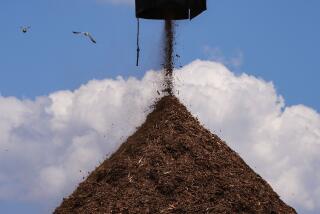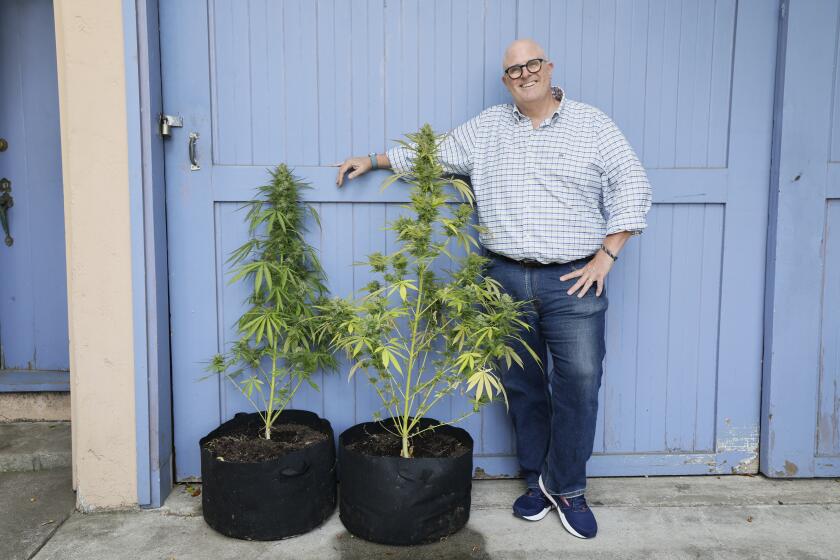Compost Plan Stirs Up Heap of Controversy : Waste: Environmentalists complain that industry’s plans to help local governments are too simplistic.
A national campaign to turn urban trash into compost will be launched today, minus potentially its most forceful advocates--environmentalists who are suspicious of the plan’s supporters.
The National Composting Program will help local governments set up composting programs in their communities as a joint project of the U.S. Conference of Mayors--currently winding up its annual conference in San Diego--and Procter & Gamble Co., the consumer products manufacturer. Technical help will come from the Solid Waste Composting Council, a consortium of compost-equipment makers, waste-management firms and consumer goods makers.
In recent years, public support has grown for diverting much of the nation’s household waste from landfills by transforming it into useful, safe compost, using high-tech versions of the natural process that turns organic matter into loam. The resulting dirt can be used for everything from topsoil along highway medians to sealing landfills themselves.
Procter & Gamble--whose disposable diapers and other products contribute to the mounds of paper waste that today fill 40% of the nation’s landfills--last year committed $20 million to projects promoting trash composting worldwide. The firm will fund much of this program as part of that effort.
“We went directly to the mayors and asked if this was something they would be interested in,” said Richard R. Nicolosi, group vice president for Procter & Gamble. “In a sense, we served as a matchmaker.”
The plan will offer U.S. cities and regional governments information on composting technology, a clearinghouse on regulatory law and market-application studies. Technical evaluations and on-site tours of the 14 operating municipal trash-composting facilities--a number expected to grow to 24 by the end of the year--will also be arranged at no charge.
But a number of environmental groups and scientists are casting aspersions on the program, even before the formal announcement of its establishment.
Though environmental activists have long supported limited composting of trash, they complain that industry’s view of the process is simplistic. Environmentalists charge that the backers’ aim is to justify continued use of consumer products that are environmentally unwise--such as disposable diapers. They also say that the council seems willing to endorse the composting systems of its members, whether they are technically sound or not.
Melvin S. Finstein, a nationally recognized composting expert at Rutgers University, said that while he delivered the keynote address at the first meeting of the composting council, he has since parted company with the group.
“Solid waste management is a political football,” Finstein said. “The real issue is to use correctly designed systems.” The council, he said, includes “those who vend systems, many of which are not very well designed to begin with.”
Finstein points to such compost firm members as Agripost Inc. of Miami and Recomp Inc. of St. Cloud, Minn. Agripost recently closed its $30-million Florida plant; both firms angered neighbors with uncontrolled odors from their facilities. Finstein, it should be noted, has been hired by an Ocean County, N.J., landfill to test a competing composting system.
Environmentalists have long supported more limited schemes than that to be announced today by the industry group.
They favor composting of yard trimmings and food waste, but not treating what is known as the mixed waste stream, or MSW--that is, paper and other components of trash. Environmental groups argue that most paper, for instance, should be recycled--to avoid cutting down more trees--not turned into potting soil.
Many members of the industry council advocate widespread composting of paper, which they say introduces economies of scale in the composting process.
“Anything that can be recycled easily and readily, send it through the (recycling) system you have,” says P&G;’s Nicolosi. “Anything that isn’t now recycled, send it through the composting facility.”
Environmentalists counter that waste-management systems should be designed to properly handle wastes, not necessarily make money. They believe mass composting could undermine fledgling efforts to recycle paper wastes.
Activists also worry that MSW composting creates a product containing contaminants, such as lead and cadmium from batteries. The output of such plants can be hard to market, they warn.
San Diego on Wednesday will select a vendor for its own facility, which will do MSW composting--though the city will also recycle much of its paper wastes. Sacramento, another member of the council, has composted yard waste for 25 years but has never favored composting mixed solid waste.
U.S. Municipal Solid Waste Most of the nation’s household trash, almost all of which is still being dumped into landfills, could be recycled or composted say experts. But one big remaining issue between envionmentalists and compost system makers and consumer product maufacturers is what do to with paper. The Solid Waste Composting Council advocates composting up to 55% of trash, including paper. But the Environmental Defense Fund and some other environmental groups advocate composting only the 1% to 2% of paper that has been contaminated by food and reycling the rest. Compostable, Composting Council Plan: Food: 7% Leaves and yard waste: 18% Paper: 40% Recyclable, Composting Council Plan: Glass: 7% Metals: 9% Plastic: 8% To Landfill: 11% Compostable, With Greater Recycling: Food: 7% Leaves and yard waste: 18% Paper: 1% to 2% Recyclable, With Greater Recycling: Glass: 7% Metals: 9% Plastic: 8% Paper: 38% to 39% To Landfill: 11% Source: Franklin Associates 1988






